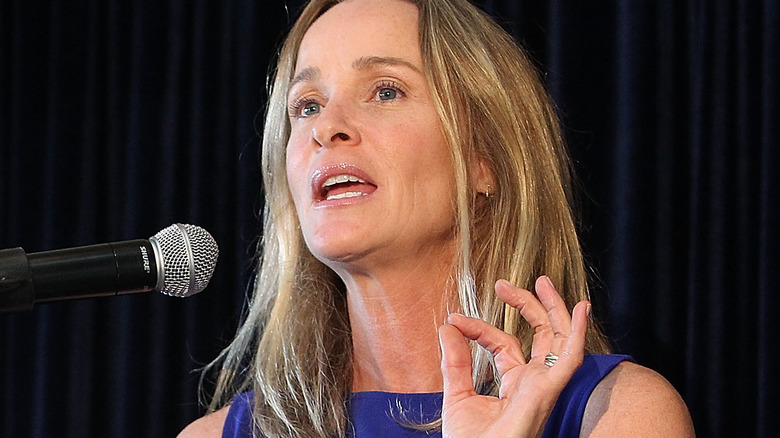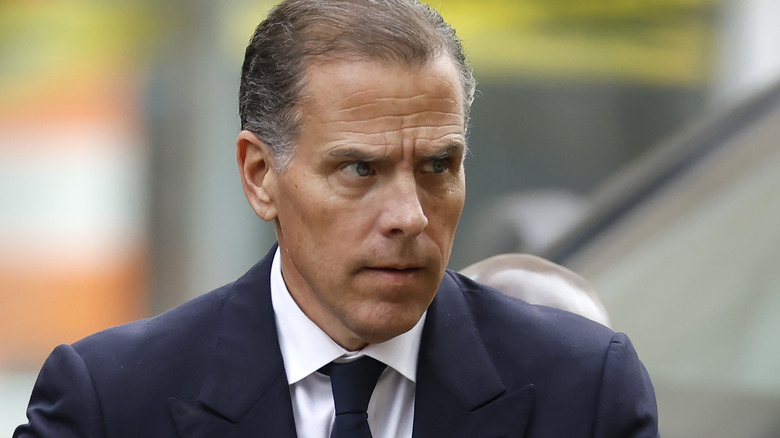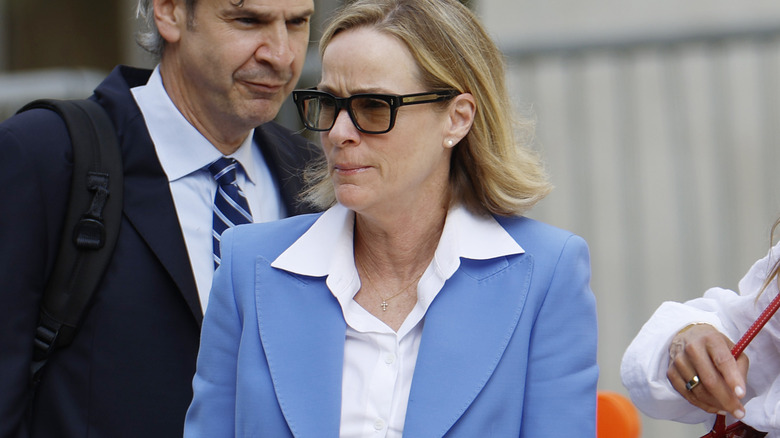Kathleen Buhle's Testimony Paints Heartbreaking Picture Of Her Life With Hunter Biden
Trigger warning: The following article contains references to drug use and addiction.
Hunter Biden faces three charges in his June 2024 gun trial, all of which have to do with paperwork for and possession of a firearm while using drugs. Biden has pleaded not guilty. While most of the trial is focused on Biden's firearm and alleged crack cocaine habit, another heartbreaking element of the case is slowly coming to light: his crumbling marriage to his ex-wife, Kathleen Buhle.
Buhle took the stand on June 5, sharing harrowing details of her time with Biden, with whom she shares three children. The couple was married from 1993 to 2017, and according to Buhle's testimony, she first discovered her husband had a drug problem in the summer of 2015. She described finding drug paraphernalia in an outdoor ashtray at their Washington, D.C., residence on July 3, 2015. "He said it was a crack pipe. He acknowledged smoking crack" (via the New York Post).
This was not be the first time Buhle had to address her husband's addiction directly. Over the course of her 25-minute testimony, the writer and mother of three described a daily life plagued with secrets, coverups, and preventative measures she felt compelled to take to keep her husband's health concerns from their family.
Kathleen Buhle claims drugs changed her relationship with Hunter Biden
The crux of Hunter Biden's gun trial is that the prosecution alleges he was actively in addiction to crack cocaine when he purchased a firearm, which is illegal under federal law. Thus, the prosecution has used witnesses like his ex-wife, Kathleen Buhle, to describe the defendant's behavior while he was using drugs. According to Buhle's testimony, the difference in Biden's behavior while using drugs was drastic.
"I was worried, scared," Buhle said on the stand (via the New York Post). "He was not himself. He was angry, short-tempered, acting in ways he hadn't when he was sober." While she admitted that he was able to pass as sober to others, she was able to notice when he was high. This understandably put a massive strain on both her relationship with Hunter and the dynamics between the couple and their three children. Buhle testified that she and Hunter split after she found the crack pipe.
"Addiction impacts the whole family, but the problem often times with addiction is there's a lot of shame surrounding it, which there shouldn't be," Buhle said in a 2022 MSNBC interview. "We all worried about my ex-husband's addiction, but we weren't talking about it. For anybody who's lived with an addict or loves an addict, they'll understand how difficult it is to watch someone struggle with sobriety and how helpless you feel."
Kathleen Buhle said she had to hide her husband's addiction from her children
Before Hunter Biden's first marriage to Kathleen Buhle ended, they had three children together: Naomi Biden in 1993, Finnegan Biden in 2000, and Maisy Biden in 2001. Considering their youngest child was still a teenager when Buhle discovered a crack pipe outside of their family home, the concerned mother started taking preventative measures to ensure her daughters weren't exposed to their father's addiction.
During her June 2024 testimony, Buhle recalled regularly checking their vehicle for drugs or drug paraphernalia to protect her children from finding it or accidentally getting in trouble with the law if they were to get stopped by the police while unwittingly driving in a car containing illegal substances or accessories. Buhle said she checked the car even after she split from Hunter and that she found drugs in the vehicle multiple times.
"I became adept at hiding the truth, at lying," Buhle wrote in her memoir "If We Break" (via Vanity Fair). "To the girls. To the outside world. To my friends and my family and to myself. In the end, it shouldn't be surprising that [Hunter] never realized his addiction's impact on our family because I never really told him."
If you or anyone you know needs help with addiction issues, help is available. Visit the Substance Abuse and Mental Health Services Administration website or contact SAMHSA's National Helpline at 1-800-662-HELP (4357).


